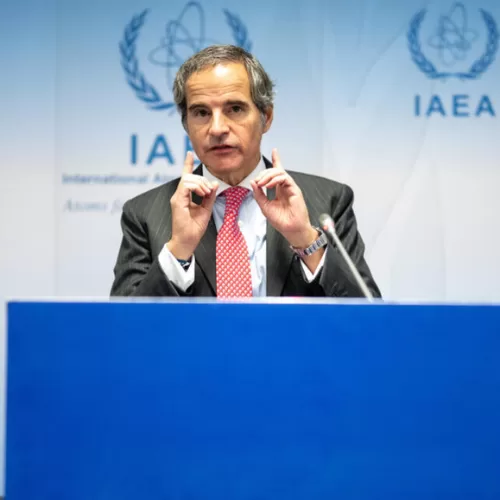A recent report from the United Nations’ nuclear watchdog, the International Atomic Energy Agency (IAEA), has revealed a significant increase in Iran’s stockpile of enriched uranium. According to the report released on May 17, Iran now has just over 900 pounds of uranium enriched up to 60 percent purity. This is a 50 percent increase from the 295 pounds reported in February.
Uranium enrichment is the process of making uranium more concentrated and powerful. While uranium enriched to 90 percent or higher can be used to build a nuclear bomb, 60 percent enrichment is already very close, making it easier for Iran to reach weapons-grade levels quickly if it decides to. The report also notes that Iran is currently the only non-nuclear weapons state with such a large stockpile of highly enriched uranium.
This rise has alarmed Western countries, who have been monitoring Iran’s nuclear program closely. Multilateral sanctions that were suspended in 2015 to control Iran’s activities are set to expire in October unless renewed. These sanctions limit Iran’s ability to enrich uranium and restrict military and missile technology trade. The Foundation for Defense of Democracies’ Andrea Stricker warns that Iran values the “sunset” of these sanctions because it would legally allow them to resume uranium enrichment and military activities.
Iran Denies Allegations and Defends Its Rights
Iran’s Foreign Minister, Seyed Abbas Araqchi, has dismissed the UN report as “politically motivated” and based on “baseless accusations.” After meeting with Omani officials, who are acting as intermediaries between the U.S. and Iran, Araqchi emphasized that uranium enrichment is vital for Iran’s economic and energy independence.
“Just because other nations are concerned, they do not have the right to deprive the Iranian people and future generations of Iran of a right that international law has granted them,” Araqchi said. He stressed that nuclear energy is an “indisputable right” for Iran, and the country is committed to peaceful use of technology.
Despite these claims, the IAEA report also details years of Iran’s noncompliance with the Nuclear Nonproliferation Treaty, raising concerns about the true purpose of Iran’s nuclear activities.
Growing International Concern and U.S. Response
President Donald Trump withdrew the United States from the 2015 multilateral sanctions agreement in 2018 and imposed strict unilateral sanctions on Iran. Though the U.S. and Iran have conducted five rounds of proxy talks since then, tensions remain high. Trump has repeatedly warned that military action, including airstrikes, is on the table if Iran does not stop its nuclear program.
China’s Teapot Refineries on the Brink: U.S.–Iran Oil Deal Could Spark Their Collapse
Public opinion in the U.S. strongly supports taking action against Iran’s nuclear ambitions. A recent Rasmussen Reports poll showed that 77 percent of likely American voters are concerned about Iran’s nuclear activities. Furthermore, 57 percent of those surveyed support the use of military force to destroy Iran’s nuclear weapons program, while 30 percent oppose such action.
Andrea Stricker explains that Iran’s nuclear goals serve multiple purposes: delaying the return of sanctions that have severely damaged its economy, calming internal unrest caused by inflation and sanctions, and advancing ideological aims that include hostility toward the U.S. and Israel. She highlights Iran’s long-standing slogans such as “Death to America” and “Death to Israel,” noting that Iran’s strategy is to buy time and appear cooperative while maintaining its nuclear capabilities.
The UN report and Iran’s firm rejection of its findings have added new urgency to the international debate over Iran’s nuclear program. As sanctions near expiration and diplomatic efforts continue, the world watches closely how Tehran’s nuclear ambitions will unfold.


